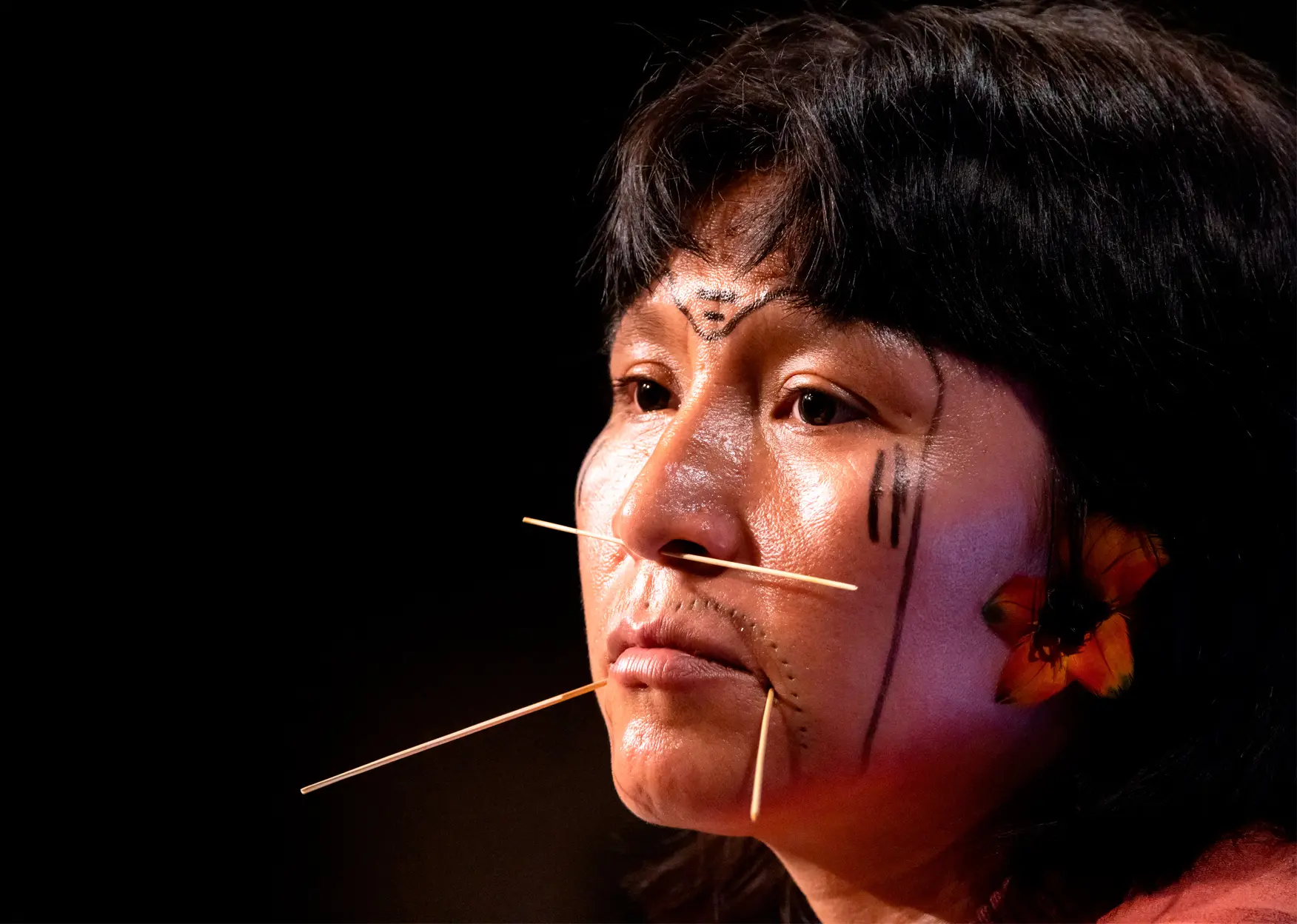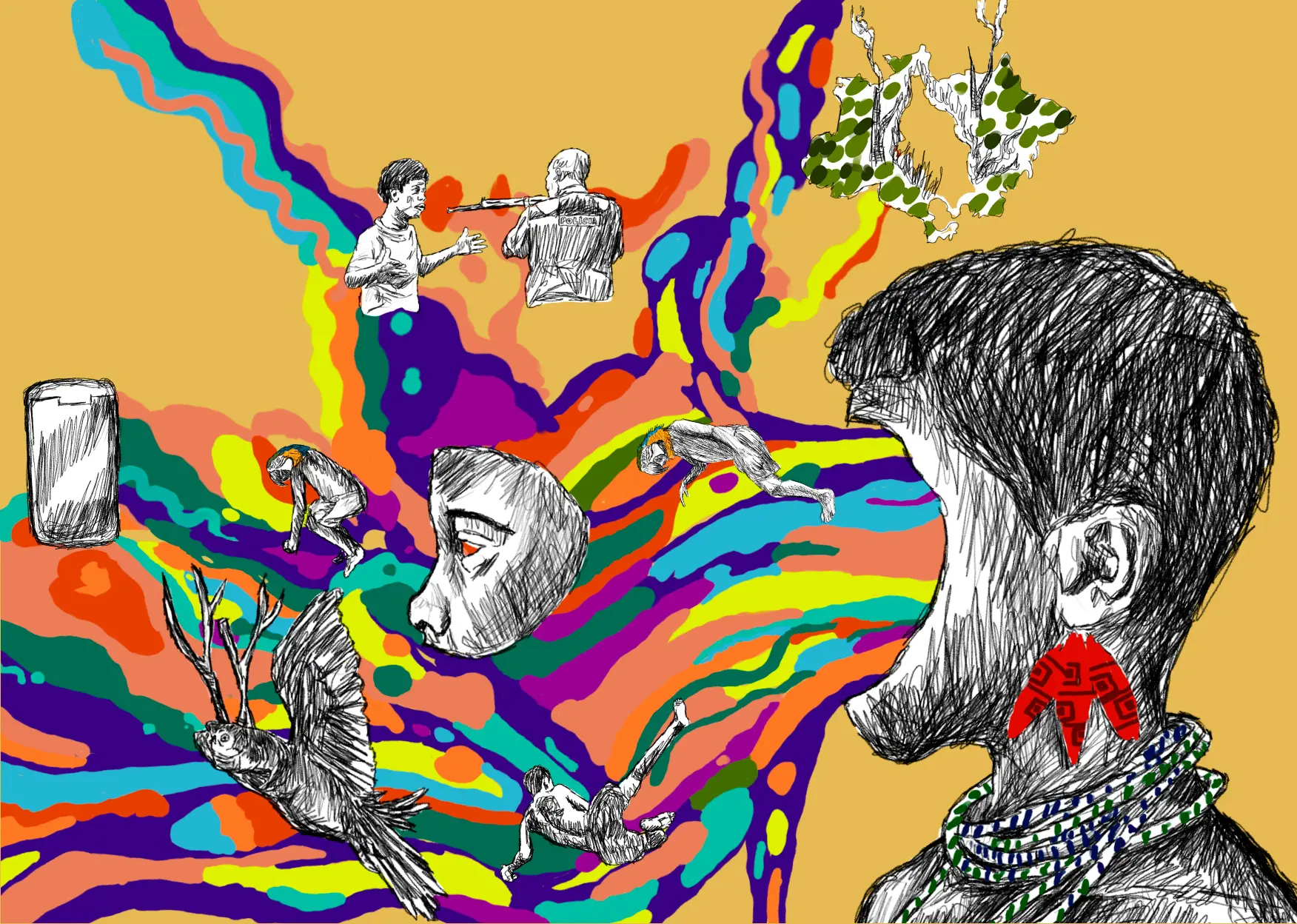In mid-September of last year, fisher Francisco Valeriano Rodrigues, 66, went out to fish near the Volta Grande do Xingu region where he lives, in the state of Pará. He gathered a group of nine people, 30 liters of gasoline for his fishing boat (a motor boat), and 30 eight-kilo blocks of ice to pack the fish. After eight days, they had visited all their usual fishing spots. They expected to return with 700 to 800 kilos of fish. But they only had 50.
Raimundo Braga Gomes, 60, a fisher, used to live in the region known as Costa Júnior, located 82 kilometers downriver from the Belo Monte Hydroelectric Plant, before his island was flooded to make way for the dam’s reservoir. During the time he lived there, he would usually catch 400 to 500 kilos of fish per week. Lately, he has only been able to fish 20 to 30 kilos.
Two fishers who have been on the Xingu River for over 40 years, two different fishing areas, but each with around the same calculated losses after the start of the Belo Monte Dam: if each outing had previously yielded hundreds of kilos of fish, that amount has now dropped to a few dozen kilos. Fishing is no longer enough to feed families.
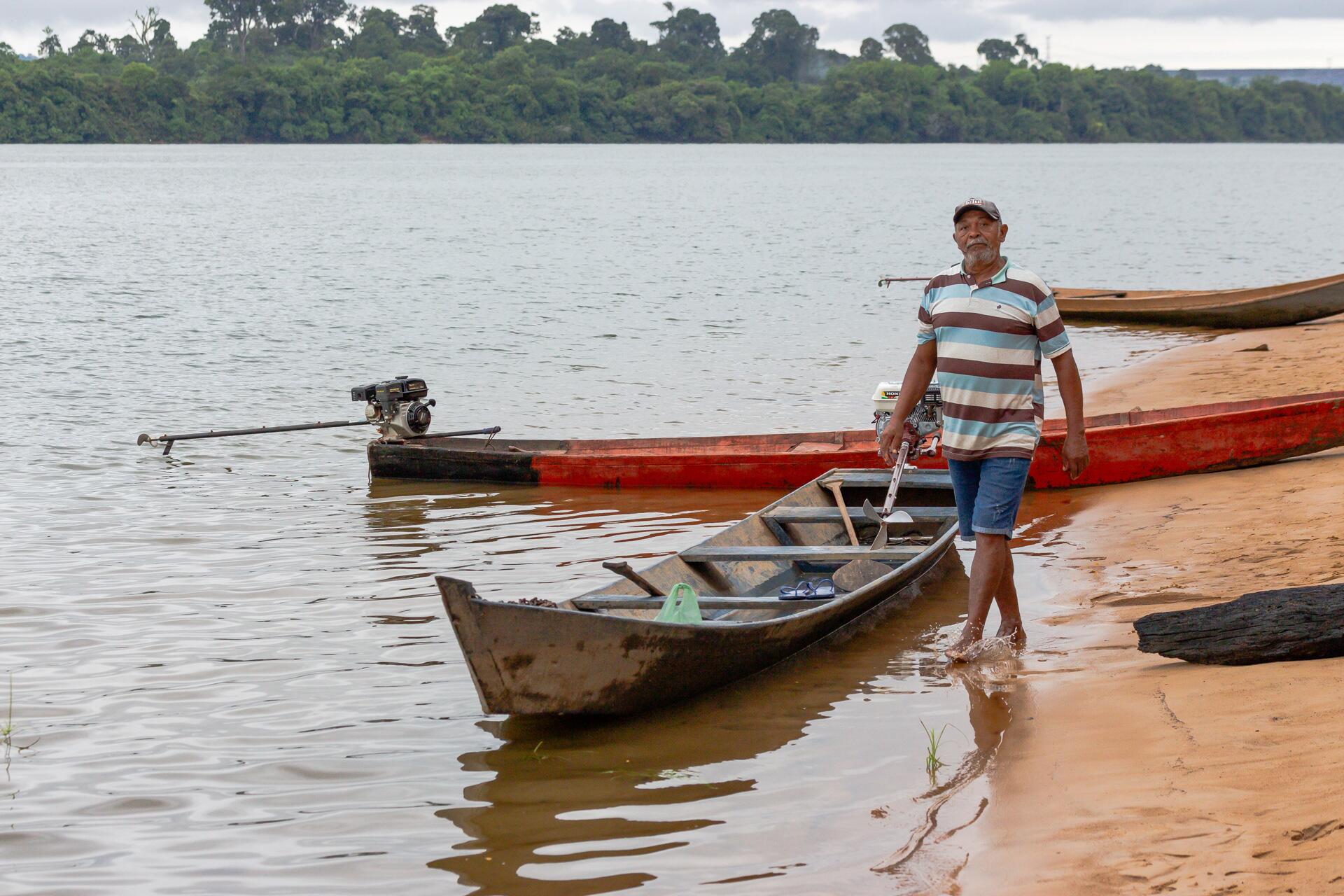
Scarcity: Francisco Valeriano Rodrigues used to fish up to 800 kilos of fish with his companions, but now they can barely feed their families
That is why Fishers and members of the traditional forest community of Ribeirinhos have come together to ask that the river be given a rest, a break for the fish to return and spawn, to grow and live in the Xingu without being fished. And, during the time their fishing activities remain suspended, they are asking for a financial guarantee of at least one year, for their families to survive.
This was one of the topics discussed at the Meeting of Guardians of the Volta Grande do Xingu Hubs, held January 12 and 14 and organized by the Xingu Vivo Para Sempre Movement – a collective of activists who oppose the Belo Monte Dam. Over 200 participants from 23 communities in the region met on Canari Island, toward the end of the “big bend” (the literal meaning of Volta Grande) in the Xingu River, near the hydropower plant’s largest turbines.
One proposal leaders will take to the government is to guarantee a monthly payment be made to Fishers and Ribeirinhos until fish numbers bounce back to a secure level for life in the region. Right now, only small-scale fishers who solely make a living from fishing are being paid a benefit for the closed season, which lasts for four months, from November 15 to March 15. This is a type of unemployment benefit, with monthly payments equal to the mandatory minimum wage for one month of full-time work, paid by the federal government to fishers during the fish spawning season. The closed season benefit is paid nationwide in Brazil and is unrelated to the Belo Monte Dam’s impacts.

Wisdom: Raimundo Gomes, who has known the Xingu for 40 years, was the first to advocate for a stop in fishing over a long period
At the Volta Grande meeting, participants also reported on the violence and intimidation they have experienced with private security forces working for Norte Energia, the Belo Monte plant’s concessionaire. “Norte Energia has used private security, who use guns to shoot warning shots at fishers at the mouth of the dam, one of the main areas where fish are still found. These security guards illegally sequester fishing equipment and canoes from the Fishers,” the Ribeirinhos and Fishers say in a document summarizing the meeting’s discussions – Norte Energia denies that its security forces possess weapons or that they have apprehended materials, while also stating there is a security zone around the plant where fishing is restricted, which is monitored by drones.
According to the Xingu Sempre Vivo Movement, the summary document will be delivered at the start of this month to the Department of Agrarian Conflict Mediation and Settlements, which is connected to the Agricultural Development and Family Farming Ministry. Members of this cabinet-level office told SUMAÚMA that government officials could visit the communities in April to formalize these reports.
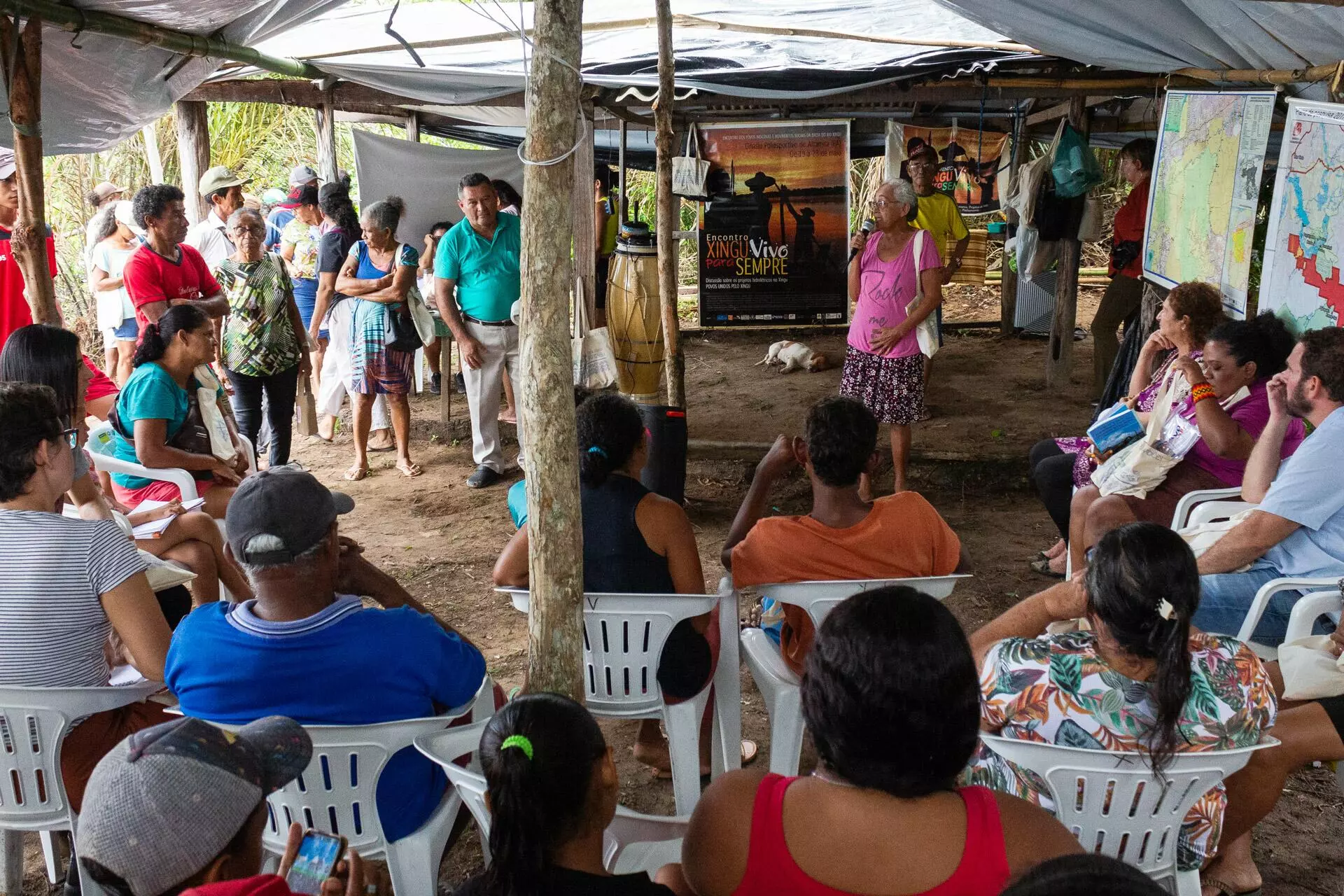
Union: Guardians of the Volta Grande, Ribeirinhos, and Fishers will bring a proposal to the government asking that they be indemnified for at least one year to save the river
The method for compensating the Fishers and Ribeirinhos is still driving discussions between Brazil’s environmental regulator, Ibama, which is responsible for issuing a license for the hydroelectric plant, and Norte Energia. Belo Monte’s license to operate expired on November 25, 2021 and has yet to be renewed by the environmental agency, which is looking at whether conditions have been met for it to make a decision.
The only government representative in attendance at the Guardians of Volta Grande meeting was Daniel Josef Lerner, the general coordinator of the Department of Agrarian Conflict Mediation and Settlements, under the Agricultural Development and Family Farming Ministry. The meeting’s participants have tasked him with facilitating dialog with other federal agencies in Brasília, so the Fishers and Ribeirinhos can submit their demands.

Government presence: Daniel Lerner, who coordinates the mediation conflict area under the Agricultural Development Ministry, listened to demands
Nine years of hazardous waters
Sara Rodrigues Lima, 40, the daughter of Francisco Valeriano, a fisher, was one of the organizers of the meeting on Canari Island. She and other Volta Grande leaders believe the “rest” the Xingu River deserves will only be possible if, in addition to paying the fishers a benefit, Ibama also forces Norte Energia to release water at a level similar to the river’s natural flow. This proposal is in opposition to the “consensus hydrogram,” the flow management regime used by the plant, which diverts up to 70% of the water from the Volta Grande region to power the Belo Monte plant’s turbines.
“The Xingu River needs the hydropower plant to release the water, so it at least reaches the low-lying fish spawning grounds, because with this fluctuation in the water, the fish are unable to lay eggs or the eggs end up going dry,” the fisher explains. This February, for the second year in a row, researchers with MATI-VGX (the Independent Environmental Territory Monitoring of the Volta Grande do Xingu Region group) found thousands of dead streaked prochilod eggs in an area of the Volta Grande known as the Odilo spawning grounds. The location, which used to flood when the river naturally flooded, creating a fish hatchery, was dry again this year.
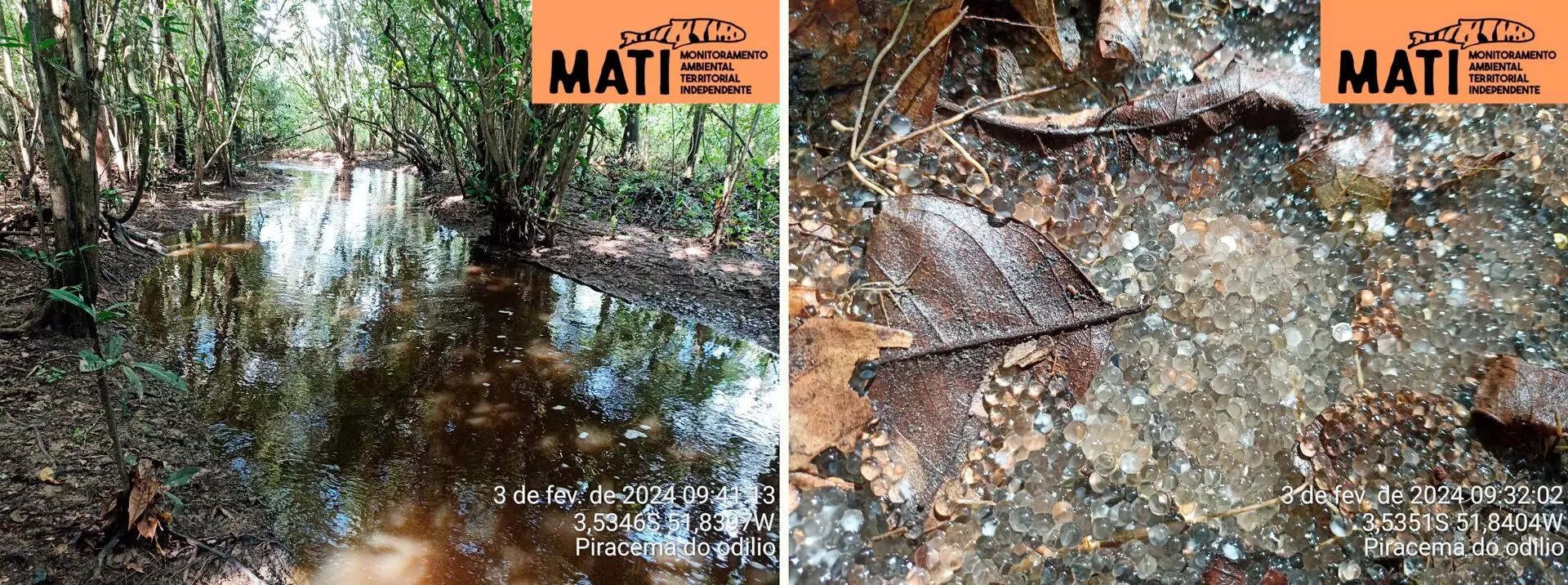
Cemetery: without enough water, fish eggs dry up and die, as seen in a picture taken by independent monitoring researcher Josiel Juruna (Mati) in February of this year
In a report on an inspection of the region done from November 27 to December 1, 2023, technical staff from the environmental regulator admitted the need to change the flow management plan used for the area and said there was a “noticeable impact on the local way of life.”
The plant’s license to operate, granted in 2015, mandates that the company provide technical assistance to affected fishers throughout the region and monitor fishing activity. Yet fish populations are falling.
A technical report by researcher Antonio Ostrensky Neto, with the Federal University of Paraná, showed a 62.6% drop in fish hauls at ports: in 2012, before work started on the dam, fishers were bringing back around 800,000 kilos. In 2022, this number was less than 300,000. The study was added to Ibama’s Electronic Information System.
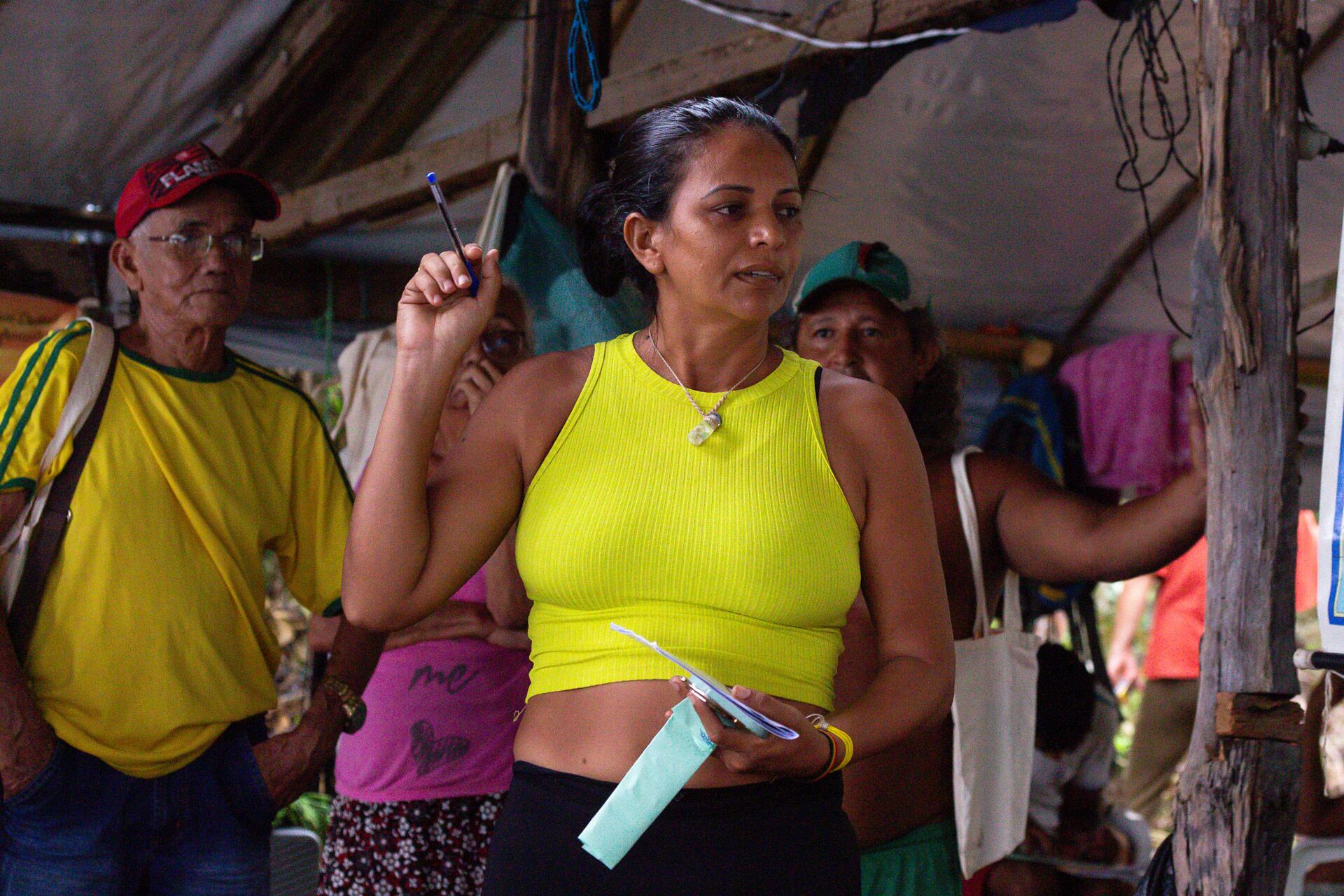
Respecting nature: Sara Rodrigues, a fisher, says that the Belo Monte Dam must ‘release the water’ for spawning grounds to form
No reparations for fishers
Because of a two year and two month delay in implementing mitigation projects, the environmental agency recommended that Norte Energia pay fishers “reparations funds.” The company proposed a payment of R$ 20,000 (around US$ 4,000) to 1,976 fishers registered between 2017 and 2019. The problem is that another 6,015 fishers, whose cases are “under consideration” by the company, are awaiting payment, as they need to prove they worked in fishing prior to 2016 (when the reservoir was filled) to qualify for these funds.
Norte Energia told SUMAÚMA that it works with a registry of fishers that was validated by the licensing agency and it has paid reparations to the over 1,400 fishers who are on this list. In a statement, the concessionaire says fishers who are not receiving the benefit and are listed in the registry can talk to the company to regularize their payment situation. Norte Energia confirms that a registry “review process” is ongoing, with “cases being considered” to include fishers working in the Belo Monte Dam’s area of influence.
To qualify for the money, fishers need to submit a series of documents to Norte Energia, prove they live in the so-called “area of direct influence” of the Belo Monte Dam, “self-declare” through a statement signed by three witness that they are actively registered as professional fishers, and answer a questionnaire about “cultural aspects” of fishing in the region.
Norte Energia has established specific criteria for each fishing class for payment of reparations: commercial fishers (artisanal and ornamental) and subsistence fishers. Commercial fishers must have had an active registration as professional fishers prior to 2016. While subsistence fishers need to have been identified by the company itself through monitoring programs and by municipal Social Aid Secretary Offices, always prior to 2016.
“It’s extremely painful for the victim to have to prove they’ve suffered a violation and, for this right to be guaranteed, they have to go through an embarrassing situation like this,” says Iury Paulino, a member of the coordination group at Movimento dos Atingidos por Barragens, a movement of people affected by dams, in Pará. The movement is proposing a model of community recognition, where the communities would indicate who is a fisher in the region, since everyone usually knows each other. Last year the MAB brought this issue to the environmental regulator, but there has been no response so far.
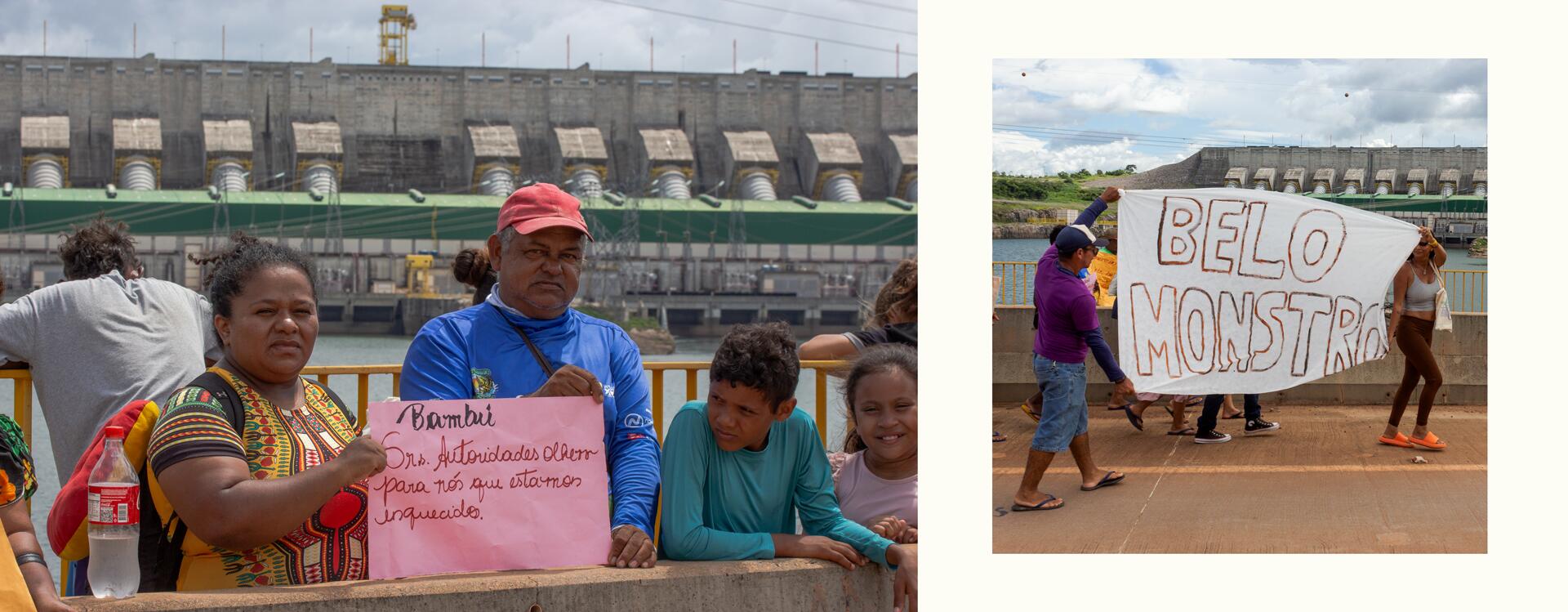
Overlooked: The Volta Grande region’s residents, who for years have suffered the tragic impacts from the Belo Monte Dam’s construction, feel they have been abandoned by the State
Joicemara Barros dos Santos and Jean Moreira dos Santos, a couple who are fishers, moved to the region from Fumaça Island, in the Volta Grande region, in 2017. Despite suffering from the impacts of the Belo Monte Dam, they did not meet the “criteria for eligibility” to receive reparations funds. They came from Goianésia, which is also in Pará. The family has seen its situation worsen over the years. “Eight years ago, in a day and a half, two days, you would catch 100 kilos of fish. Today you go out with ice, spend three days, and you don’t catch 30 kilos. There’s only enough to eat.”
‘Getting everyone’s hopes up with small fish’
Difficulty to access the river and a lack of respect for fish spawning grounds have led Jean to predict that “two, three years from now, there won’t be any more fish.” The problem is being made worse by one of the compensatory measures adopted by Norte Energia, the distribution of gillnets – a type of net used in artisanal fishing.
Jean explains: “To some communities, [Norte Energia] distributed nets with a stretch mesh of 6 and a 0.25 twine, which catches these little ray-finned fish, little fish, to get everyone’s hopes up with little fish, so this is eliminating the fish.” The stretch mesh size refers to the distance between the top and bottom knots in the mesh, in centimeters. The lower this number is, the tighter the net’s mesh, which means more small fish are captured. The other number references the line size and has to do with the thickness and strength of the mesh: when it is too thin, larger fish can rip through the net.
According to Raimundo Braga Gomes, fishing on the Xingu is becoming more predatory. He says that fishers met and decided on a proposal to limit nets to a minimum bar mesh size of 10. Nevertheless, he sees fishers today using nets with a bar mesh size of four or five. This means fish that haven’t had time to grow and breed are caught.
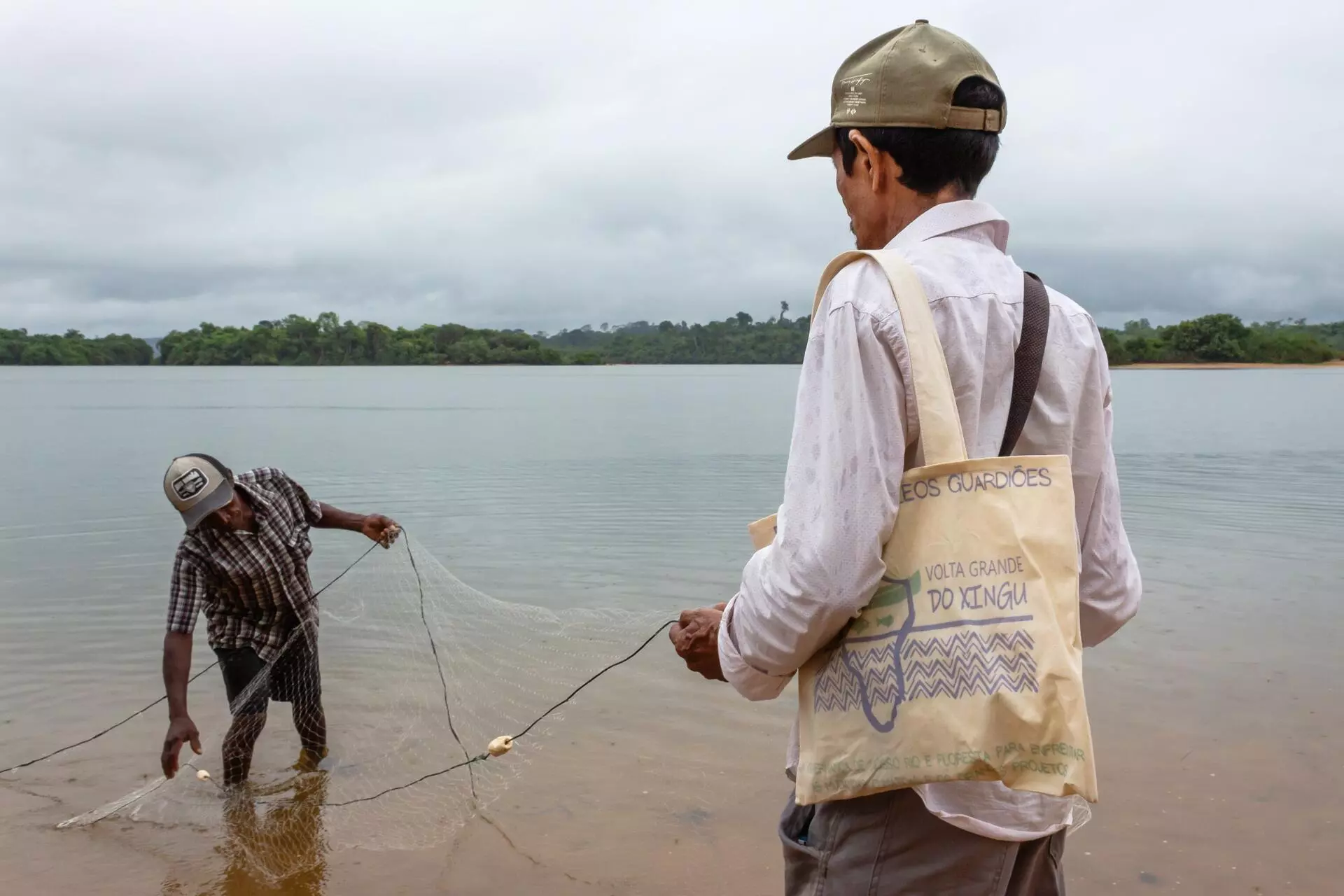
Premature death: Small fish are caught by nets with a smaller mesh size, distributed by Norte Energia, which hinders their reproduction
Another problem Raimundo points out is that the Xingu’s waters are “very muddy, just like milk, you can’t see anything.” This feeling that the water is polluted and it’s harder to fish is even felt above the reservoir, in an area that reaches the mouth of the Iriri River, a region known as a “backwater.”
“The water is dirty, nobody is catching fish, not even to eat. Over in the ports where we would stop, there’s just that old mud now,” says Raimunda Ladeira, who splits her time between Boa Esperança, a Ribeirinho locale where she fishes, and the city of Altamira.
Raimundo Braga Gomes says with a certain pride that he was the first to warn about the need to let the Xingu rest. “I have seen the Xingu River asking for help for many years, and with the arrival of the Belo Monte Dam, it is in an emergency. Fishing needs to be suspended for at least five years and, when it comes back, it has to be done with total responsibility.”
With the wisdom of someone who has known the river for more than four decades, Raimundo says the fish need time to reproduce. The way things are going, “with no oversight and with no stop,” he portends, the river and all the lives it sustains will end up foundering.
Photos: Soll
Fact-checker: Plínio Lopes
Proofreader (Portuguese): Valquíria Della Pozza
Spanish translation: Julieta Sueldo Boedo
English translation: Sarah J. Johnson
Photo Editor: Lela Beltrão
Layout and finishing: Érica Saboya
Editors: Malu Delgado (news and content), Viviane Zandonadi (editorial workflow and copy editing), and Talita Bedinelli (coordination)
Director: Eliane Brum
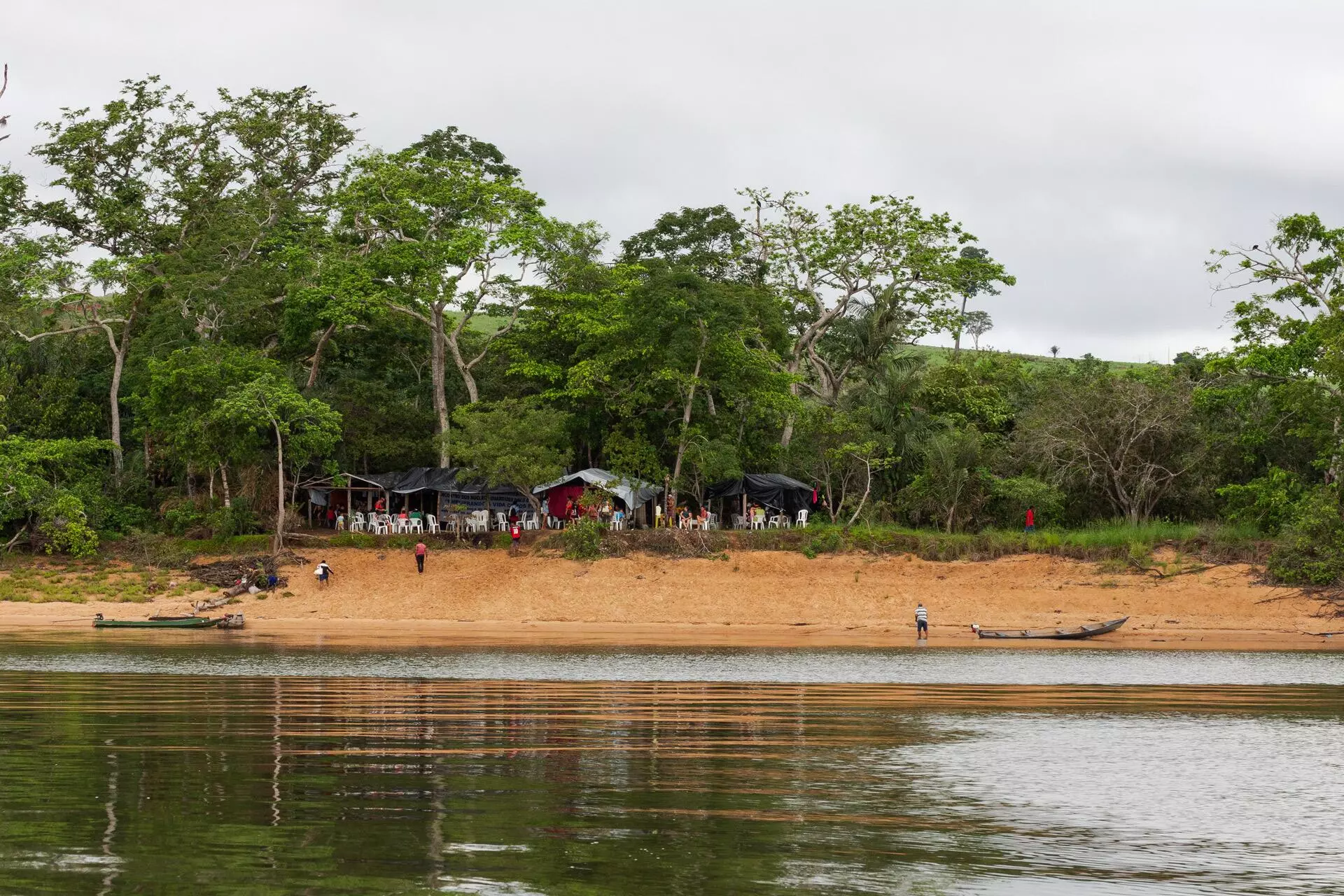
In search of peace: A movement organized by Fishers and Ribeirinhos expects requests for reparations and reports of violence to be heard

